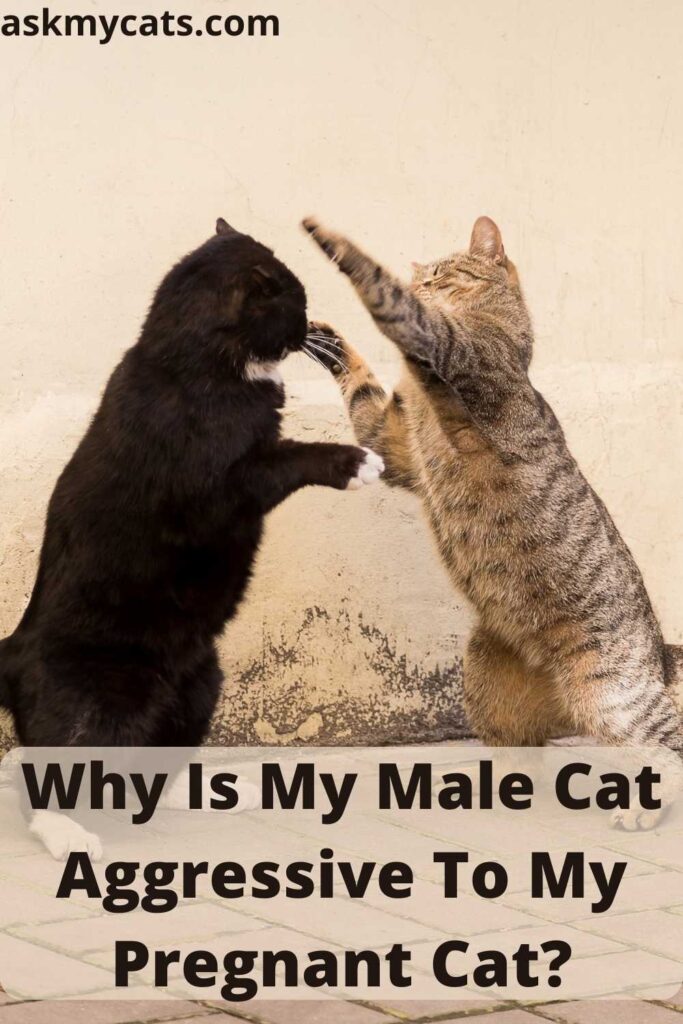Whether it’s with their playmates inside the house or with other cats outside, seeing your cat get into a fight may be quite upsetting.
So, do male cats attack pregnant females?
Yes, a male cat can sometimes attack pregnant females.
Keep reading this article to know about why a male cat attacks a pregnant female and how you avoid this.


Give Your Cat the Perfect Day
Get the Free Ebook!
Will A Male Cat Attack A Pregnant Cat?
Yes, a male cat can sometimes attack a pregnant cat.

Some cats simply won’t let peace exist. Cats may not get along for a number of reasons.
The most frequent is under socialization or a lack of positive early-life interactions with other cats.
Because he lacks feline social skills, is fearful of the unknown, and dislikes the disruption to his routine and environment, a cat who spent his entire life as the only cat may react angrily when finally exposed to another cat.
Cats typically like stability over change.
This is particularly true if the alteration involves a stranger entering your cat’s well-known domain.
Territorial species include cats. While some cats prefer to keep a good distance from their neighbors, others have much more territory overlap.
It could be particularly difficult for two unrelated males or females to share a place. Conflicting feline personalities could be another source of conflict.
Cats typically aren’t allowed to choose their housemates, and occasionally we humans don’t make the best choices.
But occasionally, cats get along just well until the other cat starts to become connected with anything unsettling or unpleasant (like fireworks or the smell of the vet’s office).
Other times, when the cats get older, their connections alter. Social maturation may be an issue if one cat reaches the age of one to three years old and then difficulty emerges.
Any abrupt change in your cat’s behavior may be a sign of a more serious condition.
Please call your veterinarian right away if you detect any strange physical or behavioral problems in your cat or if she suddenly stops eating.
It’s hard to predict how well a specific pair or group of cats will eventually get along.
Some cats are especially possessive, may never learn to live with another cat, and may thrive in a one-cat household.
However, many cat aggression issues can be effectively fixed. You might need assistance with this from your veterinarian as well as from an expert in animal behavior who is familiar with cat behavior.
Male cats with aggressiveness issues may never become best friends with the females, but they can frequently learn to accept one another with little friction.
It will require effort and time on your part to address the aggression issues that exist between household cats. Don’t give up until speaking to the right specialists.
Why Is My Male Cat Aggressive To My Pregnant Cat?
Here are some reasons, why your male cat is aggressive towards your pregnant cat: –

1. Inter-Male Aggression
Typically, adult male cats will threaten and occasionally engage in combat with pregnant females.
These behaviors can be used to challenge a female sexually or to climb the social dominance hierarchy of cats, which is rudimentarily organized.
There is a lot of ritualized bodily posturing, stalking, staring, yowling, and screaming involved in this kind of aggressiveness.
If one cat retreats and moves on, attacks are typically avoided.
If an attack happens, the attacker will typically leap forward and bite the opponent in the nape of the neck as the opponent falls to the ground on his back and uses his hind legs to try to bite and scratch the attacker’s belly.
The cats may roll around biting and yowling, stop abruptly, pick up their posture again, fight once more, or simply go away.
Cats rarely cause serious harm to one another in this way, but you should always look for puncture wounds that could become infected.
Males who have not been neutered are far more likely to fight in this fashion than intact males.
2. Defensive Aggression
Pregnant Females are known to show maternal aggression.
When another cat approaches, even one she was previously friendly with, a female cat with a litter of kittens may hiss, snarl, pursue, swat, or attempt to bite the cat.
Once the kittens are weaned, maternal aggressiveness typically decreases. To avoid future litter and aggression issues, it is a good idea to spay maternally aggressive cats.
When a cat feels he cannot flee an attack, he will act defensively in an effort to defend himself.
This can happen as a result of a person’s punishment or threat of punishment, another cat’s attack or attempted attack, or any other moment he feels frightened or afraid.
Crouching with the legs tucked under the body, laying the ears back, tucking the tail, and possibly rolling just a little to one side are all examples of defensive positions.
Because it’s not meant to deter an attack from another cat, it differs from the submission postures dogs use. A cat in this position will likely attack if you continue to approach it.
3. Redirected Aggression
This kind of aggressiveness is aimed against a different animal who wasn’t the one who initially started the activity.
A house cat, for instance, may observe an outside cat crossing the front yard while it is sitting in a window.
He may turn and attack the other family cat that is seated next to him in the window as he is unable to attack the outdoor cat.
Redirected anger might take the form of an attack or a defense.
4. Territory
Male cats are aggressive animals that frequently fight to protect the area they perceive to be their territory.
This most frequently occurs when male cats fight outside the home because your pet thinks the female pregnant cat has intruded on their territory.
Alternatively, a feral cat can think that your cat has no business being here. But these conflicts are equally frequent among cats that live together.
Your home is not an exception to how cats utilize scent to delineate their territory. If you have multiple cats living in your home, this is a common cause of conflict amongst them.
5. Rough Play
When cats are playing, things can get rough. Cats can be rough when they play, but this is not the same as hostility or fighting.
However, such play could turn into a quarrel or endanger one or both cats. If you can do so safely, it is advisable to keep your cats apart in such circumstances.
Because all feline play consists of fake aggressiveness, male cats and pregnant cats frequently engage in rough, vigorous play.
All in good fun, cats stalk, chase, sneak up on, pounce, swat, kick, scratch, ambush, attack, and bite one another.
It’s reciprocal if they’re engaging in play. They frequently switch roles.
Their bodies lean forward rather than back, their claws may be out but they don’t hurt anything, and their ears are usually forward while they play.
Cats are not packed animals and typically dislike living in both small and large groups.
Creating lots of quiet, private hiding places for “me time” as well as different feeding areas for each cat, several drinking stations, and other strategies will help make space sharing less unpleasant.
Utilizing cat-appeasing pheromone products, such as sprays to apply to household furniture or plug into diffusers, can assist in lessening stressful feelings and, as a result, lessen aggressive behavior.
These methods can be used to ease the introduction of a new cat or to lessen any aggressiveness in a household with many pets.
Interesting Read: Why Do Female Cats Attack Males After Mating?
How Do Male Cats Act When A Female Cat Is Pregnant?
Here is how an aggressive male cat acts when a female cat is pregnant: –

1. Hissing
A cat’s expression for “leave me alone.” A hissing cat is not feeling safe and secure at the time.
This is a defensive vocalization, and a hissing cat will likely go on the offensive only if they continue to feel threatened and have no other option.
When introducing cats, constant hissing signals the cat owner to slow down the process.
2. Growling
Another protective vocalization that suggests the cat feels extremely frightened and insecure.
3. Swatting
Defensive behavior in which the cat attempts to separate itself from the other animal or person.
4. Stalking And Chasing
This conduct is heavily influenced by the setting. While chasing might be caused by territorial conflicts, it can also be a joyful habit (or at least perceived as play by the cat doing the chasing).
5. Biting
This is the last resort for cats and is the result of either serious territorial difficulties and/or one or more cats feeling very unsafe and stressed.
If your cats are physically injuring each other, consult a professional cat behaviorist.
What Can I Do To Stop My Male Cat From Attacking The Pregnant Female Cat?
Here is what you can do to stop your male cat from attacking the pregnant female cat: –
- If your cat’s behavior suddenly changes, you should always consult your veterinarian for a full health assessment. Cats frequently conceal symptoms of sickness until they are very unwell. Any change in behavior could be an early sign of a medical issue.
- Any intact pets in your home should be spayed or neutered. One intact animal’s behavior can have an impact on all of your pets.
- Following this delayed introduction method, slowly reintroduce the cats. To successfully use these strategies, you may require the assistance of an animal behavior specialist.
- Consult your veterinarian about medicating your cats while you embark on a behavior modification program in extreme circumstances. Only your veterinarian is licensed and competent to provide medications for your cats.
Do not administer any over-the-counter or prescription medication to your cat without first checking with your veterinarian.
Animals may not respond to medications in the same way that humans do, and a prescription that is safe for humans may be fatal to animals.
Remember that medication isn’t a cure-all and should only be used in conjunction with behavior change. - Never allow the cats to “fight.” Fighting does not cure problems in cats, and it frequently makes things worse. Interrupt hostility with a loud clap of your hands or a water cannon spray.
- Divide their resources. Reduce cat competition by placing many, identical food dishes, beds, and litter boxes in separate places in your home.
- Make more perches available. More hiding places and perches will allow your cats to spread out as they see fit.
- Instead of attempting to calm or pacify your angry cat, simply leave her alone and give her room. If you get too close, she might turn and direct her rage at you.
- Encourage desired behavior. When you witness your cats interacting in a nice manner, praise or toss food at them.
- Pheromones are an option. You can buy a product that simulates a natural cat odor (which humans cannot detect) to help decrease stress. While the aggression problem is being treated, utilize a diffuser.
Interesting Read: Why Do Male Cat Attacking Spayed Females?
Frequently Asked Questions
What not to do if the male cat is attacking a pregnant female cat?
If your cats are fighting, don’t let them continue. Cats will not be able to work things out like dogs do since they are so territorial and do not develop stable dominance hierarchies. The more cats that fight, the worse the problem will get. Make a loud noise, such as blowing a whistle, squirting the cats with water, or throwing something soft at them, to break up a fight. Don’t try to pull them apart.
What to do if cats are still not getting along?
Don’t be afraid to seek advice from a Certified Applied Animal Behaviorist (CAAB or ACAAB) or a board-certified veterinary behaviorist (Dip ACVB). One of these experienced specialists can assess the situation and assist you in managing or resolving the disagreement between your cats.
How to stop cats from fighting outside?
The best solution for how to stop cats from fighting in this situation is to keep your cat indoors. Letting them out after dark can be especially dangerous.
Final Words
Some felines can’t seem to coexist peacefully.
Keeping them permanently apart in the house or finding another home for one of them may be more humane than making them endure years of uncomfortable coexistence because persistent stress and tension aren’t healthy for people or cats.
If you have any questions, ask us in the comments section.
References
- https://www.veterinarypracticenews.com/sexual-aggression-in-neutered-cats/
- https://www.pdsa.org.uk/pet-help-and-advice/looking-after-your-pet/kittens-cats/cat-fights
- https://www.vet.cornell.edu/departments-centers-and-institutes/cornell-feline-health-center/health-information/feline-health-topics/feline-behavior-problems-aggression
